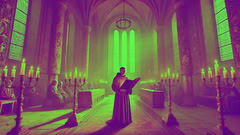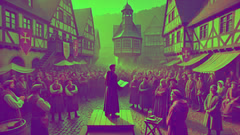Introduction
In the waning light of a German autumn, the cobblestone alleys of Quedlinburg glimmered with a golden haze. The ancient abbey’s spires, sharp against the sky, had watched over centuries of secrets and stories. Within its cool stone walls, a quiet figure moved among the dust-laden stacks of parchment and vellum—a scribe known as Otto, whose ink-stained hands and thoughtful eyes were as much a part of the abbey as its ringing bells. Otto’s world was one of whispered legends and fading candlelight, where history and myth blurred like brushstrokes on an old fresco. His most precious task was the care and transcription of the Gesta Romanorum, a revered collection of tales drawn from the wisdom of ages. Some said the stories could heal broken spirits, inspire courage in cowards, and even sway the hearts of kings. For Otto, they were a living tapestry, each thread woven by countless hands, shimmering with meaning and possibility. Yet as the leaves turned and winter’s shadow grew, Otto sensed unease. The kingdom was restless—whispers of discontent echoed from the marketplace to the throne room. Even the abbey’s prior, once buoyed by faith, now paced the halls with furrowed brow. It was then that a royal messenger, cloaked in the blue and silver of the king’s court, arrived with a summons that would alter Otto’s fate and the fate of the stories he guarded. Entrusted with the Gesta Romanorum itself, Otto would journey beyond the cloisters, into a world where the wisdom of old tales might mean the difference between ruin and redemption. Through misty forests, bustling towns, and the marble halls of power, the legend of the Gesta Romanorum would come alive—not as ink on parchment, but as living truth in the hearts of those who dared to listen.
The Summons and the Secret
Otto had always believed his world would be measured in ink and parchment. The arrival of the royal messenger shattered that certainty. The messenger’s voice was low and urgent as he delivered the king’s command: Otto was to bring the original Gesta Romanorum to the royal court at Mainz within three days. Rumors spoke of a grave illness afflicting King Konrad—a malady of the spirit rather than the flesh, resistant to both physicians and priests. The king, famed for his wisdom and justice, had grown distant, prey to brooding silence and sudden bursts of anger. His counselors whispered that only the ancient tales might reach what reason and prayer could not.

That night, as the wind pressed against the leaded windows, Otto packed the precious manuscript in a leather satchel and prepared for his journey. Before leaving, he knelt in the abbey chapel, murmuring a prayer not just for safe passage but for guidance. The prior, seeing his resolve, pressed a small silver key into Otto’s hand. "If you find yourself lost, trust in the stories. They will guide you," he whispered.
The first day’s journey led Otto through fields draped in morning mist. As he passed through the village of Altenwald, he encountered a young girl named Greta, weeping beside a toppled market stall. Her family’s livelihood—baskets of apples and salted fish—lay scattered. Remembering a tale from the Gesta Romanorum, Otto knelt beside her and spoke of a merchant who, though robbed of everything, found hope by sharing his last loaf of bread. Greta wiped her tears, inspired by the tale, and offered apples to those passing by. By dusk, her stall was restored—proof that stories could transform sorrow into strength.
At twilight, Otto entered the shadowed woods near the River Lahn. Here, the air grew thick with damp leaves and the scent of moss. He paused beneath an ancient oak whose trunk was carved with mysterious runes. There, he encountered an old woodsman named Bern, who warned him: "These woods are thick with old magic. Tread softly."
That night, Otto slept lightly by his campfire, clutching the silver key. In his dreams, a procession of characters from the Gesta Romanorum appeared—a wise judge, a cunning fox, a grieving queen—all speaking in riddles. When he woke, the fire had nearly died, and the path ahead was shrouded in mist. Otto pressed forward, guided by the memory of their words and the gentle weight of the manuscript against his heart.
The Court of Shadows
Otto’s arrival at Mainz was met with both suspicion and hope. The city bustled with markets, stone bridges arching over the swirling Rhine, and grand halls where banners snapped in the wind. Yet beneath the clamor lurked an uneasy silence. The courtiers eyed Otto’s worn robes and battered satchel with thinly veiled disdain. Only Father Matthias, the king’s confessor, welcomed him warmly. "You come not just as a scribe, but as a bearer of wisdom," he said.

The king’s chambers were dim, perfumed with incense and heavy tapestries. King Konrad sat by the window, his face lined with worry and his eyes distant. Otto knelt, presenting the Gesta Romanorum with trembling hands. Konrad’s voice was barely more than a whisper: "They say these stories hold truth beyond reason. Read to me, scribe."
Night after night, Otto recited tales from the manuscript—of emperors who ruled with mercy, of fools who stumbled into wisdom, of outcasts who found redemption. Sometimes Konrad listened in silence, other times he interrupted with sharp questions or bitter laughter. The courtiers watched uneasily, some scoffing at the idea that stories could heal a king.
One evening, after a tale of a knight who regained his honor by confessing his faults, Konrad wept openly. The court was shocked. Otto realized the king was haunted by guilt—a secret betrayal from his youth. When Otto shared a story of forgiveness and second chances, Konrad began to change. He grew gentler with his servants, listened more intently to his advisors, and even visited the town square to speak with his people.
Yet not all were pleased. Chancellor Eberhard, ambitious and cold-eyed, saw Otto’s influence as a threat. He accused Otto of witchcraft, insisting that the scribe’s tales were no more than tricks to cloud the king’s mind. A public trial was demanded. In the great hall, before nobles and townsfolk, Otto was forced to defend himself—not with argument, but by telling the oldest story in the Gesta Romanorum: a tale of truth shining brighter than any lie. As he spoke, the crowd was spellbound, and even Eberhard was silenced. Konrad declared Otto innocent, proclaiming that stories, when used with wisdom, could heal more than any sword or sermon.
The Tapestry Unravels
Despite the king’s transformation, unrest simmered throughout the kingdom. Bandit raids plagued the northern borders, and whispers of rebellion spread among discontented lords. At the king’s request, Otto journeyed to the troubled town of Eltz to mediate a dispute between rival guilds. Armed only with his satchel of stories and the silver key, Otto listened as anger boiled between cobblers and tanners, each accusing the other of treachery. He recalled a fable from the Gesta Romanorum—a parable of two brothers who quarreled until both lost their inheritance—and told it with quiet conviction. By the end, grudges softened, and a tentative peace was brokered.

Otto’s reputation grew. He traveled from village to village, always carrying the Gesta Romanorum. In shadowy taverns and firelit cottages, he shared stories that soothed feuds, mended marriages, and inspired hope among the weary. Sometimes, people offered gold or food in thanks; more often, they repaid him with stories of their own. Otto recorded these tales in blank pages at the back of the manuscript, believing that each person’s story—no matter how humble—deserved a place among the legends.
But danger followed. Eberhard’s men pursued Otto through forests and across rivers, determined to discredit or silence him. In the ancient woods near the Harz Mountains, Otto encountered Mara, a healer who tended to wounded outlaws and frightened children alike. She recognized the Gesta Romanorum and told Otto a secret: among its pages was a hidden tale, visible only in moonlight, that could reveal a path through darkness. Together, they deciphered a riddle woven into the manuscript’s margin, leading them to a secret glade lit by will-o’-the-wisps. There, Otto found a forgotten tale of reconciliation—a story so powerful that it could unite even sworn enemies.
Word reached King Konrad that Otto was missing. Fearing for his friend, Konrad dispatched loyal knights to search for him. Meanwhile, Eberhard grew bolder, seizing power in the king’s absence and stirring unrest among rival lords. The fate of the kingdom hung by a thread, and only Otto’s wisdom—drawn from the Gesta Romanorum—could mend what was broken.
Conclusion
Otto’s return to Mainz was heralded by bells and joyous cries. The tale he had uncovered in the moonlit glade—a story of bitter rivals who reconciled for the good of their people—became the inspiration for a great council called by King Konrad. Nobles, guild leaders, and commoners gathered in the grand hall, where Otto recited the forgotten legend in a voice steady and clear. Its lessons rang true: wisdom thrives where stories are shared, and peace follows when hearts are open. Moved by his words, old enemies clasped hands, and long-standing feuds dissolved. Chancellor Eberhard, confronted by his own ambition, stepped down in shame. The kingdom was restored to unity not by force or decree, but by the transformative power of tales woven from truth, hope, and human kindness. Otto remained at court as royal scribe, continuing to collect and preserve stories both old and new. The Gesta Romanorum grew, its pages inked with fresh voices and hard-won wisdom. Through famine and festival, sorrow and joy, Otto’s legacy endured—not as a man of power or wealth, but as a humble storyteller whose devotion helped a kingdom rediscover its soul. And so the legend of the Gesta Romanorum lives on: a testament to the enduring magic of stories, passed from heart to heart and age to age.













